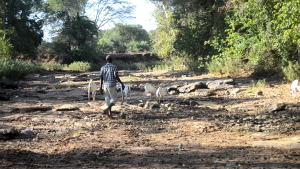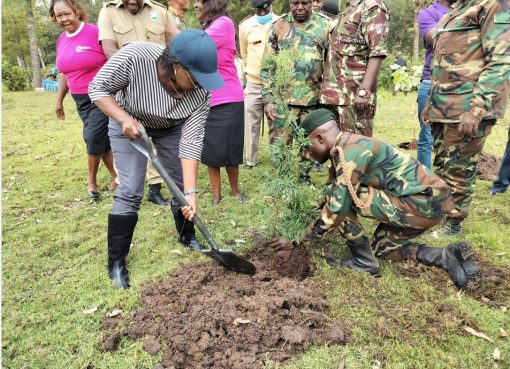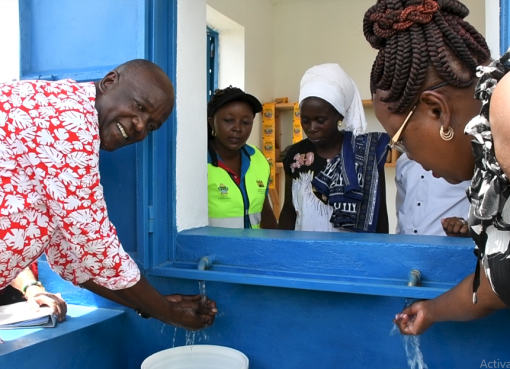
When the Biblical Noah started building the Ark other people mocked him. It took him forty years to build the Ark and it reached a point when the people labelled him a mad man. His ‘pestering’ warnings of upcoming floods were blushed of with “the hills are high and we will climb on them when the floods come”.
Scientists have continuously warned that the continued environmental degradation will lead to global warming and unprecedented prolonged droughts and heavy floods. Climate activists’ efforts over the same have turned into a mere melody for entertainment even with the apparent effects of environmental degradation being here with us.
Going back to the testimony of a Swedish teenage climate activist, Greta Thunberg, at the United Nations in September last year and listening to the usual rhetoric by our politicians one is tempted to wonder whether we are ‘listening to scientists’ who say climate change is real and that humans are responsible.
Whereas, drought has adversely affected many parts of the African continent this teenager’s advice need to be taken seriously. Even without drought, water levels have been receding, courtesy of increased human and animal populations and mankind’s cavalier attitude towards environmental conservation. Encroachment on forests has ended up destroying water catchment areas. The Mau escarpment is a good example.
“I want you to unite behind science,” Thunberg said in her testimony before the House Select Committee on the Climate Crisis in September 2019.
“I want you to unite behind science and then I want you to take action, this is not political views or my opinions, this is science.” she added.
Thunberg, who had been nominated for a Nobel Prize for her work raising awareness about climate change, has become an inspirational figure for fellow teens. She sailed from Europe to the United States on a zero-emission yacht arriving in New York City after her 15-day trip across the Atlantic Ocean.
Now we have the coronavirus wiping out people in China and rapidly spreading to other parts of the world. This may not be directly linked to climate change but the desert locust invasion of the Middle East and the East African region has all to do with the global warming effect.
The UN Secretary General, Antonio Guterees, told the 33rd African Union Summit in Addis Ababa, Ethiopia, that there was a link between climate change and the unprecedented locust crisis plaguing the Eastern Africa region. He said that warmer seas meant more cyclones generating the perfect breeding ground for the destructive locusts, a situation that is getting worse by the day.
The UN Food and Agriculture Organization says desert locusts is the most dangerous migratory pest in the World and the potential for destruction is enormous.
The breeding of the swarms continues and that upsurge presents an unprecedented threat to food security and livelihood to Kenya, Ethiopia and Somalia. The desert locusts have also spread to Uganda and Tanzania, threatening food security and livelihoods in the whole of East African region.
The Africa Solidarity Trust Fund has donated Sh 100 million to FAO to fight the worsening locusts upsurge in the Horn of Africa. FAO estimates that Sh 7.6 billion is needed to scale up efforts to contain the rapid spread of the destructive pests. So far, more than Sh.1.8 billion has been donated to fight the upsurge.
Last week the Ugandan government released (Ush 15 billion) as a contingency fund to help fight the locusts. Tanzanian government has hired three spray planes in preparation for possible invasion of the locusts. What is Kenya doing about this catastrophe that has already destroyed crops and pasture and an obvious threat to food security in the country?
Peter Munya took over from Mwangi Kiunjuri as the Cabinet Secretary (CS) in the Agriculture docket with a lot of vigour and brought hope to the Upper Eastern and North Eastern regions which were affected by then.
He moved out with choppers and spraying was done in some parts and news was all over the media that all was not lost. But come the death of former President Daniel Arap Moi and there was a paradox shift by the media to his burial arrangements.
Tharaka Nithi Senator, Kithure Kindiki, has called on the National Government to declare the desert locust invasion a national disaster. Kindiki who is also the Majority Leader in the Senate said the government should not bury its head in the sand whereas farmers and pastoralists are suffering due to the massive destruction of pasture and crops in many parts of the country.
“It is time the crisis was declared a national disaster. I have visited several areas invaded trying to chase them. They are many at Kathangacini and Maragwa in Gatunga Ward. We are tired screaming and whistling to chase the insects,” he said.
“The insects are in millions and I ask the Agriculture Department to come to the ground. It seems all desert locusts have migrated to Tharaka Nithi County. CS Peter Munya, our neighbor, says there are eight aircraft, four for spraying chemicals and four for surveillance. But where are they? Is this a hoax?”
“This is a national disaster. I have witnessed an elderly man cry helplessly after all his crops and pasture were feasted upon by the marauding insects. The government should conduct assessment and all affected families be compensated,” Kindiki said.
CS Munya says the heavy rains experienced are slowing down efforts to control the destructive pests.
“We have also been experiencing delays and shortage of the chemicals which are not found locally and are imported from Japan,” Munya said.
The CS said the President had given a go-ahead for the ministry to order direct purchase of the pesticides from the Japanese government.
Kindiki appealed to President Uhuru Kenyatta, his Deputy William Ruto and former Prime Minister, Raila Odinga to stop all political activities and focus on the fight against the locusts.
“There should be no politics at the expense of locusts. We demand that President Uhuru and Raila stop all the BBI meetings and all efforts concentrated in the fight against locusts. Whether you are elected, nominated, administrator or clergy, assist the way you can to help us deal with these insects,” he appealed.
He expressed fears the insects were breeding at an alarming rate.
Meanwhile, FAO has confirmed that numerous immature and mature swarms continue to move throughout northern and central Kenya. It warns that new swarms will be forming in March and April when eggs will be hatching in Kenya, Ethiopia and Somalia.
“Elsewhere, above-normal breeding continues along both sides of the Red Sea coast where hopper groups, bands, adult groups and a few swarms are forming on the coastal plains,” FAO said.
With the swarms now in Uganda and Tanzania, South Sudan is now on the watch list.
“In this region where there is so much suffering and so much vulnerability and fragility, we simply cannot afford another major shock. And that’s why we need to act quickly,” UN official, Mark Lowcock, told Ambassadors in New York.
“We do have a chance to nip this problem in the bud, but that’s not what we’re doing at the moment. We’re running out of time,” the Under-Secretary-General for Humanitarian Affairs and Emergency Relief Coordinator, said.
The Kenya’s UN Ambassador, Lazarus Amayo noted: “The herders will have a real challenge of pasture, and this may also cause movement from one place to another in search of pasture, with the inherent risk of communal conflict over pasture or grazing land or trespassing territories.”
The locust threat comes as the region is recovering from what Lowcock described as recent “back-to-back shocks” which have undermined resilience, with millions of people at risk of experiencing severe food insecurity.
“It is these weather events which are creating the environment to facilitate the locust outbreak,” Lowcock explained. “Unusually heavy rains and increase in the frequency in cyclones in the Indian Ocean have created favourable conditions for the locusts to breed.”
FAO recently launched a $76 million appeal to control the locusts’ spread. So far, only around $20 million has been received, roughly half of which came from a UN emergency fund.
As Lowcock cautioned: “There is a risk of a catastrophe. Perhaps we can prevent it, we have an obligation to try. Unless we act now, we’re unlikely to do so.”
The environmental degradation as attracted the wrath of nature and even after we survive the apparent disaster there is need to give the warnings of climate activists the seriousness they deserve. It was not actually raining when Noah started building the Ark.
By David Mutwiri





